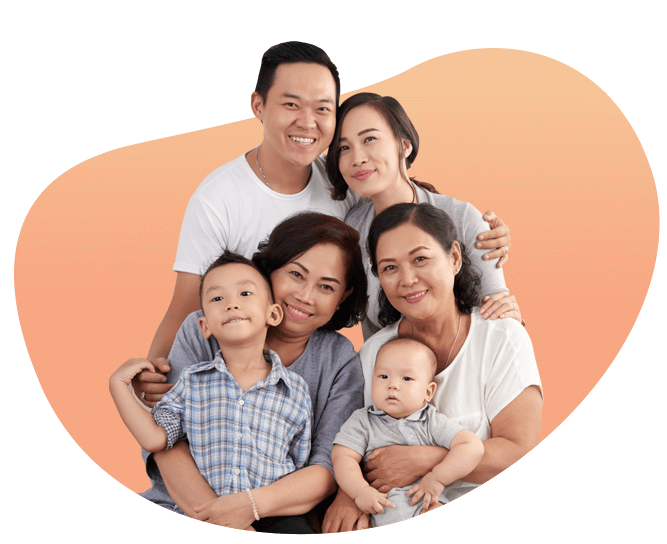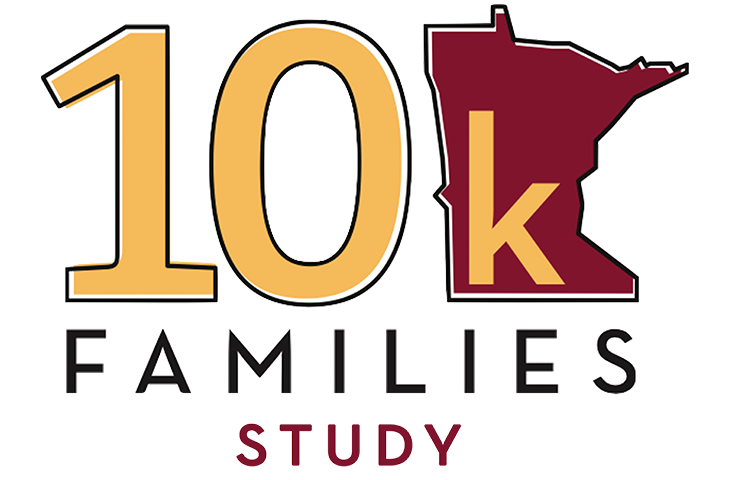What is 10,000 Families?

What is a research study?
Research studies are scientific projects that collect information about a particular topic or issue with the intention of discovering new facts, proving theories, and learning more. Studies can also provide the basis for taking action to solve problems or share findings widely so others can take action.
Research studies about health are intended to prevent, diagnose, or treat diseases or to help people become healthier overall. Some studies mainly observe individuals or groups to learn more about their health, and others try to change something related to participants’ health over a short period of time. Some studies compare the effects of one intervention, such as a particular treatment, a health education program, or a new policy to another way of doing things now or in the past.
A few examples of health studies are:
- Figuring-out how high blood pressure and cholesterol cause heart disease
- Learning why cigarettes cause lung cancer and other diseases
- Comparing the effects of a new diabetes treatment in one group with the effects of a standard treatment in another group
- Examining how having recreation opportunities and safe places to exercise in a community affects people’s physical and mental health
- Looking at how housing conditions affect asthma rates in children
Some studies follow a group of people over time, looking at their past, present and future health state. This type of research is called a cohort study. Cohort studies are one of the best--if not the best--ways that scientists have to find causes of illnesses or reasons for having good health.
To learn more about health research, visit What is Health Research? By Harvard Library.
What is the 10,000 Families Study?
10,000 Families (10KFS) is a study of family health in Minnesota. 10KFS invites families to participate over time with the purpose of understanding the influences of genetics, lifestyle, and environment on health and illness. 10KFS is a cohort study; it should last for many years so we can see the changes that happen over time.
For a family to become part of the study, a member of that family needs to take an eligibility survey first. That first member must live in Minnesota and be 18 years of age or older. If you want to know if your family is eligible, please click here.
After that member of the family receives confirmation that their family is eligible, we ask that they invite other adult family members and/or register their children under 18 years of age. The other members of the family must live in Minnesota or in a neighboring state (North Dakota, South Dakota, Iowa or Wisconsin).
For more information about what you would need to do as a participant, please visit “What do I need to do?”
Our Story
Our team includes experienced researchers who have worked for many years in the School of Public Health and the Medical School at the University of Minnesota. We have a passion for understanding what affects our health and well-being. The 10,000 Families Study provides an opportunity to gather information that can be used to develop better advice on how to live a healthy life and to guide policies to promote health and reduce illness.
In 2017 we started the 10,000 Families Study to address the unique health needs of Minnesota. For example, Minnesota has a large population living in rural areas, where exposures to environmental factors are very different than in urban areas. Further, communities of color are growing in numbers. Today 25% of all new births in the state are from those communities. Equally important, Minnesota has 11 American Indian reservations and a large urban American Indian population--more than most cities and states.
We are also excited about beginning to use new technologies for gathering health measurements. These technologies make the collection of samples and information easier in-person and give us the ability to collect them remotely.
Some things we expect to learn from the Study:
- How the microorganisms, bacteria, viruses, etc., present in the gastrointestinal tract (called “microbiome”) affect a person’s health
- More about common diseases thanks to new technology, such as digital applications for physical measurements, genetic testing capabilities, and other research technologies
- Why some groups of people suffer from poor health more than others (health disparities)
- How exposures to new risks like vaping/e-cigarettes and environmental changes affect health
- How and why common diseases get transmitted from one generation to another
We also want to provide other health researchers with a source of information they can use to do more research to benefit health now and into the future. That information includes everyone’s information combined with others and without any identity information on it..
Why do we need 10KFS?
In the words of our Principal investigator Dr Logan Spector, Professor, Pediatrics
“Following large groups of people over time is the single best way to understand why some people get disease and some stay healthy. 10,000 Families is a unique example because we're following families rather than unrelated individuals. This is important because families share both genes and habits that can affect health, so 10,000 Families will be especially powerful. My hope is that the students I'm training today will be running the study 30 years from now and beyond.”
What our participants say about their experience with 10KFS:
“We were glad to support this study on family health. The process [at the health visit] was smooth and easy, the people were friendly, and made it a very pleasant morning!”--Kristin
“I am participating in this study with my family to help researchers learn more about how to keep families healthy. It is so interesting how we are each born with genetic patterns, but we have lots of choices we can make to be healthier. I want to help learn more about the connection there.”--Maria
“I thought it would be a good opportunity to demonstrate a piece of the scientific/research process to my son. I’m hoping the results can help Minnesota to provide a healthy environment for all our children and families to grow up in.”--Eric
Have more questions? Please review our frequently asked questions


